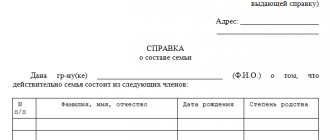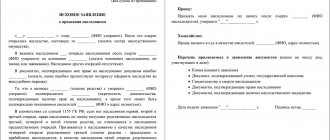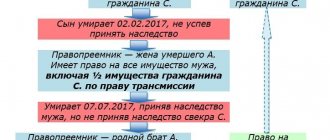Home » Inheritance » Acceptance of inheritance under condition or with reservations
The death of the testator is not the only condition for hereditary succession. The property of the deceased still needs to be accepted. By this, the heir expresses a desire to become the new owner of the deceased’s property and the executor of the obligations assigned to him. And it is this last point that often causes inconvenience for heirs.
Bequest, assignment or payment of the debts of the deceased is an undesirable burden that sometimes accompanies an inheritance and must be performed at his expense. And when the successor wants to accept only a certain part of the property or rid himself of unnecessary obligations, he is interested in the possibility of accepting the inheritance under conditions or with reservations. But is this allowed by law?
Mechanism for accepting inheritance
The essence of inheritance is set out in Art. 1110 of the Civil Code of the Russian Federation. She defines this process as universal succession, during which the property of the deceased passes to his heir at a time and unchanged. In practice, this means that the entire volume of rights and obligations due to a specific successor (even within one share) are inseparable from each other and cannot be transferred into ownership in parts, selectively or in stages. At the same time, from the composition of the hereditary mass, according to Art. 1112 of the Civil Code of the Russian Federation, some elements of the legal capacity of the deceased are excluded.
Rights and obligations that are closely related to the personality of the testator are not inherited:
- moral rights;
- intangible benefits;
- obligation to pay alimony (with the exception of debt already existing at the time of death);
- the right to compensation for harm caused to the health and life of another citizen, etc.
Acceptance of the property of the deceased is carried out in two ways: actually or officially.
The actual acquisition is considered completed when the following actions are performed in relation to the inherited property:
- control;
- content;
- usage;
- protection from attacks by third parties.
Even if the heir begins to repay the debts of the deceased or makes the actual acquisition of at least one object of inheritance, all other property within the framework of his allotted share will be considered accepted. But the ownership of such property is not subject to state registration due to the lack of a certificate of inheritance. And you can only get it through official registration with a notary. This is the main advantage of the second method of accepting an inheritance.
To carry out official succession, the heir will need to collect a package of documents, write an application for the issuance of a certificate of title and provide all this to the notary at the place of opening of the inheritance. From this moment, property rights and obligations are assigned to the successor. But theoretically (according to paragraph 4 of Article 1152 of the Civil Code of the Russian Federation), their transition occurs earlier and coincides with the date of death of the testator, even if the inheritance was accepted later.
Deadlines for accepting an inheritance
The fact of acceptance of the inheritance is determined either by a notary, or it is determined in a court hearing.
The actual acceptance of the inheritance is determined by a notary.
The heir, within six months from the date of death of the relative or testator, applies to the notary, declaring acceptance of the inheritance.
If the potential heir lived with the testator on his territory and continues to look after the housing and pay for services, the notary recognizes the actual acceptance of the inheritance. If an application for acceptance of the inheritance has been written, you can complete the final paperwork accepting the inheritance and re-register the documentation in your name without any problems after any period of time.
In other situations, it is necessary to apply to the court to establish the actual acceptance of the inheritance. There may be several people filing a claim. The court will determine that the inherited property has actually been accepted if there are no property disputes. If there are disagreements, they are also disputed in court. The court decision is issued after it enters into legal force. Acceptance of inheritance is carried out in the presence of a notary.
General term for acceptance of inheritance
The right of inheritance is guaranteed by the Constitution of the Russian Federation. And the Civil Code of the Russian Federation establishes rules and procedures that regulate relations in the field of inheritance. According to Art. 1154 of the Civil Code of the Russian Federation, acceptance of an inheritance is carried out within a specified period, the total period of which is six months . However, the course of such a period begins differently, depending on the specific circumstances. For example:
- from the date of opening of the estate (in this case, this day is the day of death of the testator);
- from the date of entry into force of the judicial act (in the case when the court declares the citizen dead);
- the day specified in the judicial act (when the date of death is unknown, the court sets the estimated date).
This period is calculated in calendar months. If the end of the period for accepting inherited property falls on holidays or weekends (non-working days), then the end date of such period will be considered the next working day.
Special deadline for accepting inheritance
The special period for accepting an inheritance implies the opportunity to enter into an inheritance after the end of six months from the date of its opening. According to Art. 1154 of the Civil Code of the Russian Federation, this is possible if one of the heirs has renounced the rights to the inheritance or cannot accept it for the reasons described in Art. 1117 of the Civil Code of the Russian Federation (persons identified as unworthy heirs). In this case, the person to whom these rights are transferred receives six months to accept the inheritance.
It is necessary to take into account that the total period, starting from the opening of the inheritance and ending with its acceptance , cannot exceed nine months .
Example: The deceased was left with two sons, to whom all the property was bequeathed. Apart from them, the presence of close relatives was unknown. The first application was submitted to the notary two months after the opening of the inheritance. The second son learned about his mother's debts, which were supposed to go to him and his brother. Since the amount of the debt was equal to the value of the inheritance, he renounced his rights to it.
The only distant relative of the deceased received the rights to receive the inheritance. Since the refusal was made only 4 months after the death of the testator and 2 months before the end of the six-month period, the legatee (new heiress) received additional time to collect documents and think about the decision. Ultimately, seven months after the opening of the inheritance, the notary received by mail a second application, certified by a notary at the place of residence of the heiress.
If a citizen is declared dead
The law determines that the day of opening of the inheritance mass is the day of death of the testator. In this regard, the question arises - what to do when the date of death of a citizen is unknown? The norms of civil law and legislation regulating notaries do not allow a notary or other person to arbitrarily appoint the day of opening of an inheritance.
The only authority that has the authority to resolve this problem is the court. Only the court has the authority to make a decision to recognize the testator as deceased or, in this case, to establish the date of the (presumable) death of the testator.
- The court makes a decision based on the law and evidence presented by the parties.
- The court must request, both on its own initiative and at the request of persons from law enforcement agencies or other authorities, information necessary to make an appropriate decision.
Relatives or law enforcement agencies can declare a person dead. But this is only permissible if there is no information about the citizen for five years .
The date of opening of the inheritance in such situations will be the day when the judge’s decision comes into legal force.
The citizen applied to the court to declare her husband dead. In support of her application, the plaintiff informed the court that her husband, with whom she had lived together for more than nine years, had left to work and there had been no information about him for five years.
Acting in the interests of their young son, the plaintiff asks the court to recognize her husband as deceased, so that their joint son enters (by right of representation) into the inheritance that opened up after the death of her mother-in-law.
Earlier, the district court decided to declare her husband missing due to the fact that the search did not produce results. Witnesses told the court that they allegedly communicated on the phone with the plaintiff’s husband a couple of years ago and objected to him being declared dead.
Guided by paragraph 1 of Art. 45 of the Civil Code of the Russian Federation, a person about whom there is no information, including his whereabouts for five years, may be declared dead by the court. The court is critical of the testimony of witnesses, since they did not provide evidence that this particular citizen, the plaintiff’s husband, spoke to them on the phone.
Also, taking into account the fact that the Department of Internal Affairs has opened a case to search for the specified person and at present law enforcement agencies do not have information or information about the missing citizen.
The court decided to satisfy the application and recognize the plaintiff’s husband as dead, due to the sufficiency of the evidence presented to the court. Also, the court considered that
establishment of the legal fact that the said person is recognized as dead has legal significance for the protection of the legal rights and interests of the plaintiff’s young son.
In case of refusal of inheritance or removal from inheritance
There are cases when the heir for some reason does not accept or cannot accept the inheritance. Then the heirs will be other persons who have the right to this after such a right arises for them. In this case, the time frame for accepting the inheritance mass for these persons will depend on the specific circumstances .
For example, the period for taking measures to accept inherited property for these persons will be six months (clause 2 of Article 1154 of the Civil Code of the Russian Federation) in the following cases:
- when renouncing inheritance rights in the event of submitting a written refusal to a notary, the period for new persons will be calculated from the moment such refusal is certified by a notary;
- when a citizen is removed from inheritance, the reporting period begins from the moment the relevant decision enters into legal force .
A three-month period is established for the acceptance of the inheritance mass for these persons under the circumstances specified in paragraph 3 of Art. 1154 of the Civil Code of the Russian Federation. Thus, if a citizen renounces inheritance rights, in the case where the citizen does not take any measures regarding the inheritance (in this situation this will be calculated as non-acceptance of the inheritance), the three-month period for other persons begins only when the six-month period period will expire .
With hereditary transmission
Hereditary transmission occurs when the heir dies before taking over the rights of inheritance. In this situation, the heirs of the deceased citizen, who did not have time to accept the inheritance, will be called to the inheritance mass. The period for these persons to enter into inheritance rights will be no more than three months (Article 1156 of the Civil Code of the Russian Federation) from the end of the six-month period that has passed from the date of death of the previous heir.
In March 2014, citizen “A” filed a lawsuit against the Administration of the municipal district to establish the fact of acceptance of the inheritance. From the case materials it follows that her aunt died in 2001, after whose death an inheritance opened in the form of a house and a plot of land.
The only heir was the plaintiff's father. Due to illness and then death in April 2002, the plaintiff's father was unable to apply for acceptance of the inheritance. However, the plaintiff claims that her father committed actions that indicate the actual acceptance of the inherited property, namely: he organized and paid for the funeral of his aunt, and disposed of her household property.
The court, studying the case materials, made the following conclusions. In accordance with Art. 1156 of the Civil Code of the Russian Federation, in the case when a citizen who was called to inherit died without accepting the inheritance within the period regulated by law, this inheritance passes to the heirs of this citizen. In this case, the right of inheritance can be exercised by the appropriate persons on a general basis.
Thus, according to the law, the period for taking actions to accept the inheritance mass cannot exceed three months after the end of the six-month period from the date of death of the testator. If such a period is missed, the court may restore this period at the request of the heir, in accordance with Art. 1155 of the Civil Code of the Russian Federation.
Since the plaintiff's father died in April 2002. Consequently, the beginning of the period for accepting inherited property in the order of hereditary transmission will be reported from April 2002. It turns out that more than eleven years had passed when the claim was filed.
The plaintiff refers to the fact that she lived abroad all this time and did not know about the inheritance. The court was provided with an employment contract with a foreign company, as well as a foreign passport with marks of stay.
The court refused to satisfy the plaintiff's demands, based on the fact that the plaintiff had missed the statute of limitations, and also had not presented to the court a valid reason for her absence. The plaintiff’s arguments that she did not know about the opened inheritance cannot serve as a basis for satisfying the claims.
Is acceptance of inheritance subject to condition or with reservations allowed?
The legislative position on this matter is strict and unambiguous: according to Art. 1152 of the Civil Code of the Russian Federation, the acquisition of an inheritance under conditions or with reservations is not allowed. The entire due volume of inherited rights and corresponding obligations passes under the responsibility of the heir who took actions to accept them.
In this case, the testator has every right to establish these conditions or reservations. In the will, he is free to dispose of his property and accompany it with additional obligations, which will become the responsibility of the specified successors. It could be:
- performing a specific service that has a generally useful purpose (caring for a garden, keeping an animal, etc.);
- provision of an inherited thing (part of it) for temporary or lifetime use by the specified person;
- payment of periodic payments to the citizen mentioned in the will;
- acquisition and transfer of an item designated by the testator into the possession of a third party.
If the heir is bequeathed an apartment in which, at the will of the owner, a certain person should live, he can either agree with this state of affairs and accept the inheritance in the form established by the testator, or refuse it completely, without the possibility of restoring inheritance rights. The law does not provide for a third.
Actual acceptance of inheritance
What does the law understand by this term?
The following actions speak about FPN:
- the heir began to use the inherited property
- took measures to protect him;
- maintains it at his own expense
- paid the testator's debts from his own money
- accepted the money due to him
What does this mean in each specific case? Let's explain with examples.
EXAMPLE 1: Actual acceptance of an apartment
A mother, her daughter and her daughter’s husband lived in the apartment. After the death of the mother, the daughter and her husband continue to live in the same place: they use furniture, dishes, household appliances, and pay utility bills.
EXAMPLE 2: Actual acceptance of the vehicle
After his father's death, his son drives his father's car to work and back, fills up gas at his own expense, and repairs the car.
EXAMPLE 3: Acceptance of a dacha and land plot
After the death of the owner of the dacha, her son, his wife and children come there for the weekend. There the family replaced the stove and re-laid the floors. Several new apple and pear trees were planted on the site.
Actual acceptance of part of the inheritance means acceptance of the entire inheritance.
How to waive inherited rights and obligations
Acceptance of inheritance belongs to the category of civil rights, not obligations. And this means that the potential heir should not assume the obligations, as well as the rights of the deceased citizen, if for some reason he does not want to do so. To declare no claims to the inheritance, he will need to renounce them. This can be done in two ways: submit the appropriate application to a notary or ignore the acceptance procedure.
The first method requires the heir to perform the following actions:
- Writing an application. It is necessary to indicate the full name, address of the notary and the applicant (if there is a representative), contact details of the applicant, the content of the subject of the refusal and its nuances (absolute or in favor of the specified person).
- Submission to the notary conducting the inheritance case. If the case has not yet been opened, it is necessary to select an authorized person assigned to the territory of the testator’s last place of residence.
The second method requires absolutely nothing from the disinterested heir. A simple failure to appear before the notary within the period established by law is equivalent to a refusal and after six months the right of inheritance passes to other successors. However, such inaction is undesirable from their point of view. Firstly, the entire process of registering property is significantly delayed, and secondly, there is a risk of disputes arising, for example, when an indirectly renounced heir dies, and his successor begins to claim the inheritance instead (by way of hereditary transmission).
An official refusal is necessary if the property of the deceased has already been accepted by the heir in fact or notarially. And it must be completed no later than six months from the date of death of the testator. The only exception is actual inheritance: if the successor did not have time to file the waiver, the period may be extended if there are good reasons for the absence.
Despite the unequivocal position of the law, there is no need to rush into abandoning inherited property even if the accompanying obligations seem unacceptable. A way out of this situation can be found by minimizing the inconvenience associated with accepting an unwanted part of the inheritance mass, or by carefully checking their thoroughness and legal fairness.
Each case is individual, so truly useful recommendations cannot be general. Lawyers of the site ros-nasledstvo.ru are ready to share their professional opinion on the issue you are interested in and give up-to-date advice on how to resolve it free of charge.
FREE CONSULTATIONS are available for you! If you want to solve exactly your problem, then
:
- describe your situation to a lawyer in an online chat;
- write a question in the form below;
- call Moscow and Moscow region
- call St. Petersburg and region
Save or share the link on social networks
(
1 ratings, average: 5.00 out of 5)
- FREE for a lawyer!
Write your question, our lawyer will prepare an answer for FREE and call you back in 5 minutes.
By submitting data you agree to the Consent to PD processing, PD Processing Policy and User Agreement
Useful information on the topic
4
How to restore the missed deadline for accepting an inheritance
The law limits the period allotted for accepting an inheritance to 6 months from...
97
How to enter into an inheritance after death without a will according to law
A will is an act of unilateral expression of the will of the testator, allowing one to determine the future fate...
9
How to enter into an inheritance after the death of a husband
The rules and procedure for entering into inheritance are regulated by the third part of the Civil...
29
What documents are needed to bequeath an apartment in 2021
The reason for drawing up a will is the desire of the testator to clearly identify the future owners...
21
Inheritance of a privatized apartment after the death of the owner by law and will
After privatization, the apartment used on the basis of a social tenancy agreement passes...
92
How much does it cost to enter into an inheritance from a notary in 2021?
The amount of expenses for entering into an inheritance after death depends on...










